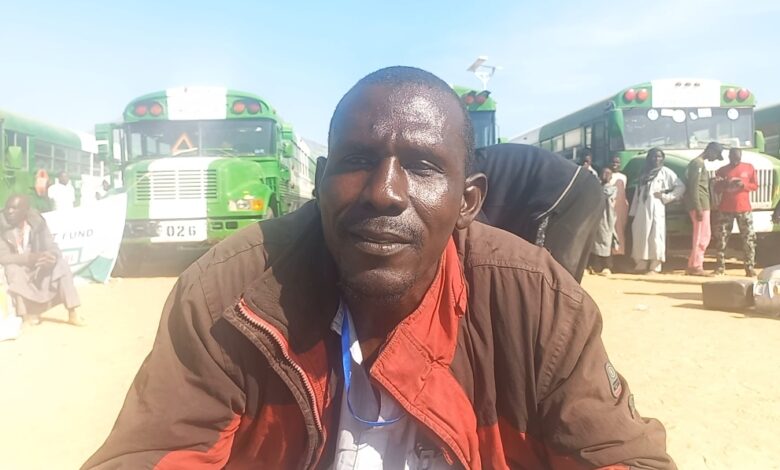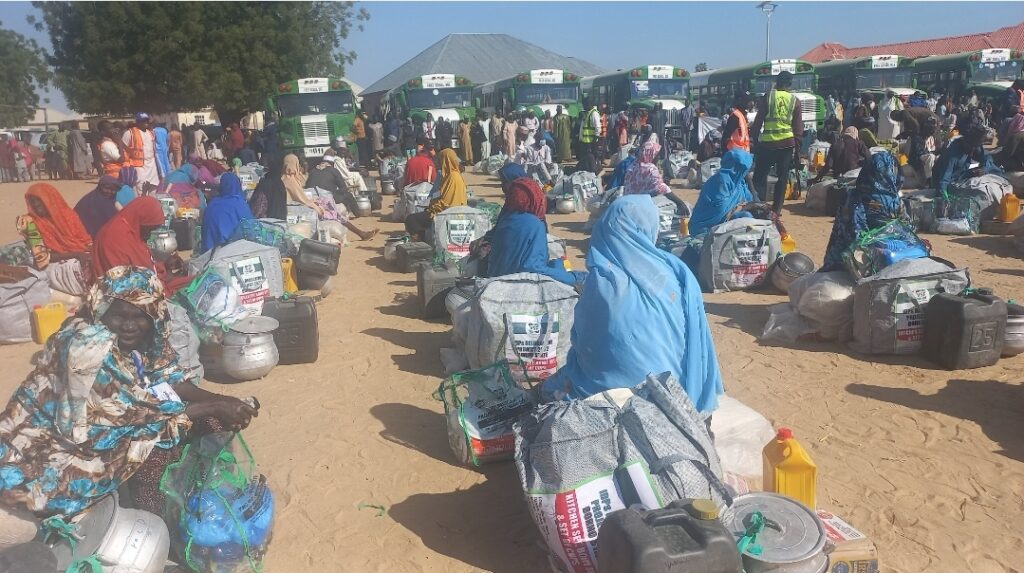IDP Camps Close But No End To ‘Camp Life’ For Many Displaced People
As the state authorities closed the last official camp, IDPs worried that the government's decision to get them moved to their local government headquarters does not offer much hope for a better life.

There was a bit of buzz at the Gubio displacement camp in Maiduguri, Northeast Nigeria, on Thursday, Dec. 1, as government officials supervised the facility’s closure and the relocation of the IDPs.
Gubio IDP camp was one of the earliest displacement camps set up by the Borno State government to receive people like Umar Mustapha, 48, who escaped Boko Haram’s bloody attacks on their communities.
It’s been over eight years since Mustapha and his family fled Kernoa, a fishing and farming community in the Marte area near the receded shorelines of Lake Chad.
“We fled when Boko Haram terrorists went wild attacking villagers and killing anyone who stood in their way,” the father of 12 recalled.
Mustapha never envisaged staying displaced for more than a month. He had hoped the situation back home would be promptly dealt with by the government. But his hope was dashed.
“Here we are, just being profiled to return home after about eight years and some months of living in the most dehumanising condition,” he said with a shake of his head.
On the last day in camp, Mustapha and others sat on bags of processed maize surrounded by other food and goods distributed by the government to all the homebound IDPs.
Mustapha had also received the sum of ₦50,000 ($112), being the male head of his household, as the cash he would use to start up life on getting home.
“The women are to get ₦25,000 ($56) each,” he said.
“My two wives are over there in the queue to get their BVN [bank verification number] sorted so that the money can drop into their bank accounts,” he said, pointing at a crowd of women sitting at a distance within the dusty camp.
Bank officials engaged by the government were in the camp helping the departing IDPs to enrol in an instant banking scheme that would enable them to get their cash through a Point of Sale (POS) device on their arrival home.

The Borno State government had collaborated with the Victim Support Fund (VSF), a Federal Government relief agency, to facilitate the closure of the three remaining official camps in Maiduguri.
The VSF is a fund set up in July 2014 with ₦58.7 billion ($132.3 million) in initial public donations to cater to victims of armed violence across the country.
In July this year, the Borno State government said it wrote a letter to the VSF asking for ₦1.7 billion ($3.8 million) to facilitate the closure of the last three official camps in the state capital, which the fund approved.
On July 28, the government had, under the watch of the VSF officials, flagged off the closure of camps and the return of IDPs at Dalori 1, Dalori 2, Muna El-Badawi, and Gubio Road. Only two of the camps were closed at the time of flag-off in July. Muna El-Badawi and Gubio remained open until November this year, when the VSF officials returned to continue the exercise.
The VSF and the state government officials said over 11,000 IDPs from the four camps would be returned to their camps at the end of the exercise.
VSF executive director Nana Tanko said they would “monitor the safe and successful resettlement of displaced persons who indicated a willingness to return to their homes following improved security.”
The resettlement programme involves the provision of resources and money that could serve as a business grant.
Tanko said if IDPs chose not to return to their villages, they could use the money provided for them to rent a house and live in Maiduguri. Otherwise, they would receive accommodation and help with transportation to their local government headquarters where they would temporarily stay until their hinterland communities were cleared of all dangers from the Boko Haram hostility and rebuilt for habitation.
Borno state Governor, Zulum had assured his government “would speed up the reclaiming of communities that are inaccessible so that our people can fully return to their ancestral homes.”
For now, the returned IDPs would be put up in camps set up within New-Marte which is the headquarters of Marte local government.
There are 26 other villages and hamlets under Marte local government area, which are currently inaccessible due to the violent activities of the Boko Haram terrorists.
Returnees’ worries and fears
Like many other departing IDPs, Mustapha said he was left confused and saddened by how his return to his ancestral Local Government Area was handled.
The IDPs alleged that the cash allowance was not distributed exactly as promised.
“We were told that before departing the camp, we would be handed food, non-food items, and cash of about ₦100,000, but what they later handed to us was ₦50,000,” Mustapha said.
“This worries me because the amount is too small to cater to all our logistical needs. We understand that we are to cater for arranging our accommodation at the camp there and things like building materials are way too expensive.
“It is a good thing that at least one is relocating from a camp far away from home to one near home, but what difference does it make? We are still going to be confronted with the same problems, if not worse than what we have suffered here in the last eight years. Yes! Unlike the Maiduguri camps, where our wives and kids still have the leverage of going to the township to do menial jobs or beg for alms to feed, Marte is a village with limited resources where everyone is poor and the surrounding forests are not safe. Survival is going to be tougher.”
Falmata Bukar, 28, like many of the other resettling IDPs, was happy they were “moving towards home”, though she was very worried the order to leave came suddenly.
“Though I got married and had my two children in this camp, I have never stopped dreaming of returning home where I was born someday,” Falmata, who was pregnant with a third child, said.
“But my dilemma, and that of many women, is that I don’t know where I would be putting up when we arrived at New Marte because I learned it is still going to be an IDP camp. I cannot leave with others for Marte now because this (camp closure) came suddenly and my husband has gone to the shores of Lake Chad to do some paid labour.”
She had to use some of the cash support to pay boys to move her properties to the town, where she would wait for her husband.
As much as she wants to return home, she would rather remain in Maiduguri.
“I am pregnant now and I would have loved to have my child here in Maiduguri rather than risk going to Marte. I suffered so much during our last child’s delivery. Without the clinics in town, I would not have survived it. I am not sure going to Marte camp is healthy for me, but only my husband will decide when he returns.”
Family and camp life
Mustapha’s biggest worry is not the lack of food and decent shelter or access to necessities but “the eroded family values and poor child upbringing that afflicted us in this camp for the past eight years”.
“My heart bleeds each time I wake up to face the reality that I have little or no control over how my children live their lives in the camp,” he observed.
“The children have been exposed to all manner of social ills and parents cannot even do much to tame them. That was not the kind of life I hoped for them to live. Back in our villages in Marte, we were raised decently by our parents even though we are poor.”
Mustapha lamented that many families are concerned about how and where their wives or children go to source food and other necessities.
“Here in the camp, it’s a free-world kind of life because the parents and the children depend on handouts for survival,” he said.
“Sometimes your son or daughter will venture into the town and will not return till late in the evening, and there is little or nothing one can do about it because one has failed as a father to fend for them.
“Sometimes, men have to travel to distant places to do paid jobs on farms just to see what we provide for the family. Sometimes, one has to move out not because you have jobs to do but to escape from the trauma of watching your child living a life one is not proud of as a parent. It’s very painful, and that situation has led to many parents dying of heart attacks.”
Mustapha wished he was headed to his ancestral hometown of Kernoa and not the IDP camp in Marte.
“I don’t have the resources to rent a house in Maiduguri for the 16 members of my family. That’s why I have to accept to follow others to go back to the IDP camp in Marte. There is nothing I can do for now than to accept the fact that one is heading home for the continuation of the sufferings of the past eight years.”
Support Our Journalism
There are millions of ordinary people affected by conflict in Africa whose stories are missing in the mainstream media. HumAngle is determined to tell those challenging and under-reported stories, hoping that the people impacted by these conflicts will find the safety and security they deserve.
To ensure that we continue to provide public service coverage, we have a small favour to ask you. We want you to be part of our journalistic endeavour by contributing a token to us.
Your donation will further promote a robust, free, and independent media.
Donate HereStay Closer To The Stories That Matter




